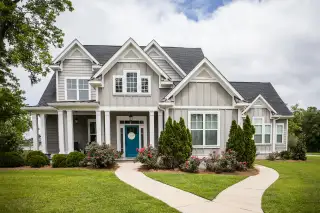Mortgage Rates Just Hit an All-Time Low. Nearly 22 Million Homeowners Could Benefit

With the coronavirus stocking fears of a global economic slowdown, tumbling interest rates mean millions of homeowners got a potential piece of good news Thursday, as mortgage rates hit a new record low.
According to data from Freddie Mac, the national average rate for a 30-year fixed-rate mortgage was 3.29%, with an average of 0.7 points paid, for the week ending March 5, the lowest level in its 50-year history. The average rate for a 15-year fixed-rate mortgage was 2.79% through Thursday, with an average of 0.7 points paid. For a 5-year adjustable-rate mortgage it was 3.18%, with 0.2% point paid.
The new rate comes two days after the Federal Reserve unexpectedly cut interest rates for the first time since the financial crisis, sending yields on the 10-year Treasury — which banks use to peg mortgage rates — below 1% for the first time. The average rate for a 30-year mortgage was 4.94% as recently as November 2018. Rates spent most of 2018 and first months of 2019 above 4%, before beginning to fall sharply as economic growth slowed.
Even before Thursday's record rate, mortgage refinancing applications had spiked, more than doubling for the week ended Feb. 28, according to the Mortgage Bankers Association.
Should You Refinance Your Mortgage?
Locking in today's low mortgage rates could save you thousands over time. But it doesn't make sense for every homeowner. Real estate data and analytics firm Real estate Black Knight suggests some parameters to consider: As a rule of thumb, it’s probably only going to be worth your while if you can switch out your existing mortgage for one with at least a 0.75% lower rate. This is because the cost of refinancing can run between $3,000 and $5,000, once you factor in fees for appraisals, title searches and so on.
Based on the spread between what mortgage borrowers are currently paying and what they could expect to pay on a new loan, Black Knight found that there are nearly 22 million homeowners today who could save three-quarters of a percentage point — or more — if they refinanced their mortgages. (The report was released before Thursday's record low, so the number could have increased further.)
Black Knight further characterizes good refinance candidates as homeowners with 30-year mortgages who have 20% or higher equity in their homes. Since payments on a typical fixed-rate mortgage amortization schedule are concentrated towards paying off interest rather than principal in the early years of the loan, it might take a few years to reach that equity threshold if your down payment was lower than 20%. Fortunately, home values are rising in many parts of the country, which can accelerate your equity accrual.
To be a good candidate for refinancing, Black Knight also says you should be current on your existing loan and have a credit score of 720 or higher. Even when factoring in these credit score and equity considerations, Black Knight says the number of borrowers who would be good candidates for refinancing jumped by 3.3 million — a 40% increase — in a mere four weeks.
Even if you purchased a home fairly recently, refinancing might make good financial sense: There are roughly 1.7 million million homeowners who took out mortgages in 2018 who are good refinance candidates, and another 900,000 who took out mortgages as recently as last year who are good candidates, according to Black Knight.
More from Money:
Best Mortgage Refinance of 2020
The Fed Just Cut Interest Rates on Coronavirus Fears. Here’s What That Means for You and Your Money
The New Rules for Figuring Out How Much Home You Can Really Afford